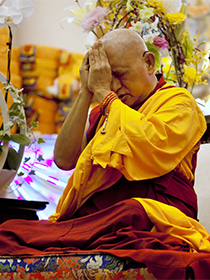- Home
- FPMT Homepage
Foundation for the Preservation of the Mahayana Tradition
The FPMT is an organization devoted to preserving and spreading Mahayana Buddhism worldwide by creating opportunities to listen, reflect, meditate, practice and actualize the unmistaken teachings of the Buddha and based on that experience spreading the Dharma to sentient beings. We provide integrated education through which people’s minds and hearts can be transformed into their highest potential for the benefit of others, inspired by an attitude of universal responsibility and service. We are committed to creating harmonious environments and helping all beings develop their full potential of infinite wisdom and compassion. Our organization is based on the Buddhist tradition of Lama Tsongkhapa of Tibet as taught to us by our founders Lama Thubten Yeshe and Lama Thubten Zopa Rinpoche.
- Willkommen
Die Stiftung zur Erhaltung der Mahayana Tradition (FPMT) ist eine Organisation, die sich weltweit für die Erhaltung und Verbreitung des Mahayana-Buddhismus einsetzt, indem sie Möglichkeiten schafft, den makellosen Lehren des Buddha zuzuhören, über sie zur reflektieren und zu meditieren und auf der Grundlage dieser Erfahrung das Dharma unter den Lebewesen zu verbreiten.
Wir bieten integrierte Schulungswege an, durch denen der Geist und das Herz der Menschen in ihr höchstes Potential verwandelt werden zum Wohl der anderen – inspiriert durch eine Haltung der universellen Verantwortung und dem Wunsch zu dienen. Wir haben uns verpflichtet, harmonische Umgebungen zu schaffen und allen Wesen zu helfen, ihr volles Potenzial unendlicher Weisheit und grenzenlosen Mitgefühls zu verwirklichen.
Unsere Organisation basiert auf der buddhistischen Tradition von Lama Tsongkhapa von Tibet, so wie sie uns von unseren Gründern Lama Thubten Yeshe und Lama Thubten Zopa Rinpoche gelehrt wird.
- Bienvenidos
La Fundación para la preservación de la tradición Mahayana (FPMT) es una organización que se dedica a preservar y difundir el budismo Mahayana en todo el mundo, creando oportunidades para escuchar, reflexionar, meditar, practicar y actualizar las enseñanzas inconfundibles de Buda y en base a esa experiencia difundir el Dharma a los seres.
Proporcionamos una educación integrada a través de la cual las mentes y los corazones de las personas se pueden transformar en su mayor potencial para el beneficio de los demás, inspirados por una actitud de responsabilidad y servicio universales. Estamos comprometidos a crear ambientes armoniosos y ayudar a todos los seres a desarrollar todo su potencial de infinita sabiduría y compasión.
Nuestra organización se basa en la tradición budista de Lama Tsongkhapa del Tíbet como nos lo enseñaron nuestros fundadores Lama Thubten Yeshe y Lama Zopa Rinpoche.
A continuación puede ver una lista de los centros y sus páginas web en su lengua preferida.
- Bienvenue
L’organisation de la FPMT a pour vocation la préservation et la diffusion du bouddhisme du mahayana dans le monde entier. Elle offre l’opportunité d’écouter, de réfléchir, de méditer, de pratiquer et de réaliser les enseignements excellents du Bouddha, pour ensuite transmettre le Dharma à tous les êtres. Nous proposons une formation intégrée grâce à laquelle le cœur et l’esprit de chacun peuvent accomplir leur potentiel le plus élevé pour le bien d’autrui, inspirés par le sens du service et une responsabilité universelle. Nous nous engageons à créer un environnement harmonieux et à aider tous les êtres à épanouir leur potentiel illimité de compassion et de sagesse. Notre organisation s’appuie sur la tradition guéloukpa de Lama Tsongkhapa du Tibet, telle qu’elle a été enseignée par nos fondateurs Lama Thoubtèn Yéshé et Lama Zopa Rinpoché.
Visitez le site de notre Editions Mahayana pour les traductions, conseils et nouvelles du Bureau international en français.
Voici une liste de centres et de leurs sites dans votre langue préférée
- Benvenuto
L’FPMT è un organizzazione il cui scopo è preservare e diffondere il Buddhismo Mahayana nel mondo, creando occasioni di ascolto, riflessione, meditazione e pratica dei perfetti insegnamenti del Buddha, al fine di attualizzare e diffondere il Dharma fra tutti gli esseri senzienti.
Offriamo un’educazione integrata, che può trasformare la mente e i cuori delle persone nel loro massimo potenziale, per il beneficio di tutti gli esseri, ispirati da un’attitudine di responsabilità universale e di servizio.
Il nostro obiettivo è quello di creare contesti armoniosi e aiutare tutti gli esseri a sviluppare in modo completo le proprie potenzialità di infinita saggezza e compassione.
La nostra organizzazione si basa sulla tradizione buddhista di Lama Tsongkhapa del Tibet, così come ci è stata insegnata dai nostri fondatori Lama Thubten Yeshe e Lama Zopa Rinpoche.
Di seguito potete trovare un elenco dei centri e dei loro siti nella lingua da voi prescelta.
- 欢迎 / 歡迎
简体中文
“护持大乘法脉基金会”( 英文简称:FPMT。全名:Foundation for the Preservation of the Mahayana Tradition) 是一个致力于护持和弘扬大乘佛法的国际佛教组织。我们提供听闻,思维,禅修,修行和实证佛陀无误教法的机会,以便让一切众生都能够享受佛法的指引和滋润。
我们全力创造和谐融洽的环境, 为人们提供解行并重的完整佛法教育,以便启发内在的环宇悲心及责任心,并开发内心所蕴藏的巨大潜能 — 无限的智慧与悲心 — 以便利益和服务一切有情。
FPMT的创办人是图腾耶喜喇嘛和喇嘛梭巴仁波切。我们所修习的是由两位上师所教导的,西藏喀巴大师的佛法传承。
繁體中文
護持大乘法脈基金會”( 英文簡稱:FPMT。全名:Found
ation for the Preservation of the Mahayana Tradition ) 是一個致力於護持和弘揚大乘佛法的國際佛教組織。我們提供聽聞, 思維,禪修,修行和實證佛陀無誤教法的機會,以便讓一切眾生都能 夠享受佛法的指引和滋潤。 我們全力創造和諧融洽的環境,
為人們提供解行並重的完整佛法教育,以便啟發內在的環宇悲心及責 任心,並開發內心所蘊藏的巨大潛能 — 無限的智慧與悲心 – – 以便利益和服務一切有情。 FPMT的創辦人是圖騰耶喜喇嘛和喇嘛梭巴仁波切。
我們所修習的是由兩位上師所教導的,西藏喀巴大師的佛法傳承。 察看道场信息:
- FPMT Homepage
- News/Media
-
- Study & Practice
-
-
- About FPMT Education Services
- Latest News
- Programs
- New to Buddhism?
- Buddhist Mind Science: Activating Your Potential
- Heart Advice for Death and Dying
- Discovering Buddhism
- Living in the Path
- Exploring Buddhism
- FPMT Basic Program
- FPMT Masters Program
- FPMT In-Depth Meditation Training
- Maitripa College
- Lotsawa Rinchen Zangpo Translator Program
- Universal Education for Compassion & Wisdom
- Online Learning Center
-
- Prayers & Practice Materials
- Overview of Prayers & Practices
- Full Catalogue of Prayers & Practice Materials
- Explore Popular Topics
- Benefiting Animals
- Chenrezig Resources
- Death & Dying Resources
- Lama Chopa (Guru Puja)
- Lama Zopa Rinpoche: Compendium of Precious Instructions
- Lama Zopa Rinpoche: Life Practice Advice
- Lama Zopa Rinpoche Practice Series
- Lamrim Resources
- Mantras
- Prayer Book Updates
- Purification Practices
- Sutras
- Thought Transformation (Lojong)
- Audio Materials
- Dharma Dates - Tibetan Calendar
- Translation Services
- Publishing Services
- Ways to Offer Support
- Prayers & Practice Materials
-
- Teachings and Advice
- Find Teachings and Advice
- Lama Zopa Rinpoche Advice Page
- Lama Zopa Rinpoche: Compendium of Precious Instructions
- Lama Zopa Rinpoche Video Teachings
- ༧སྐྱབས་རྗེ་བཟོད་པ་རིན་པོ་ཆེ་མཆོག་ནས་སྩལ་བའི་བཀའ་སློབ་བརྙན་འཕྲིན།
- Podcasts
- Lama Yeshe Wisdom Archive
- Buddhism FAQ
- Dharma for Young People
- Resources on Holy Objects
- Teachings and Advice
-
-
*If a menu item has a submenu clicking once will expand the menu clicking twice will open the page.
-
-
- Centers
-
- Teachers
-
- Projects
-
-
-
-
*If a menu item has a submenu clicking once will expand the menu clicking twice will open the page.
-
-
- FPMT
-
-
-
-
-
If you follow self-cherishing thoughts, those thoughts become your identity. Then anger, pride, the jealous mind – all this negative emotional stuff arises. When you let go of the I and cherish others, negative emotional thoughts do not arise. That’s very clear. Anger does not arise at those you cherish.
Share
Lama Zopa Rinpoche
-
-
-
- Shop
-
-
-
The Foundation Store is FPMT’s online shop and features a vast selection of Buddhist study and practice materials written or recommended by our lineage gurus. These items include homestudy programs, prayers and practices in PDF or eBook format, materials for children, and other resources to support practitioners.
Items displayed in the shop are made available for Dharma practice and educational purposes, and never for the purpose of profiting from their sale. Please read FPMT Foundation Store Policy Regarding Dharma Items for more information.
-
-
24
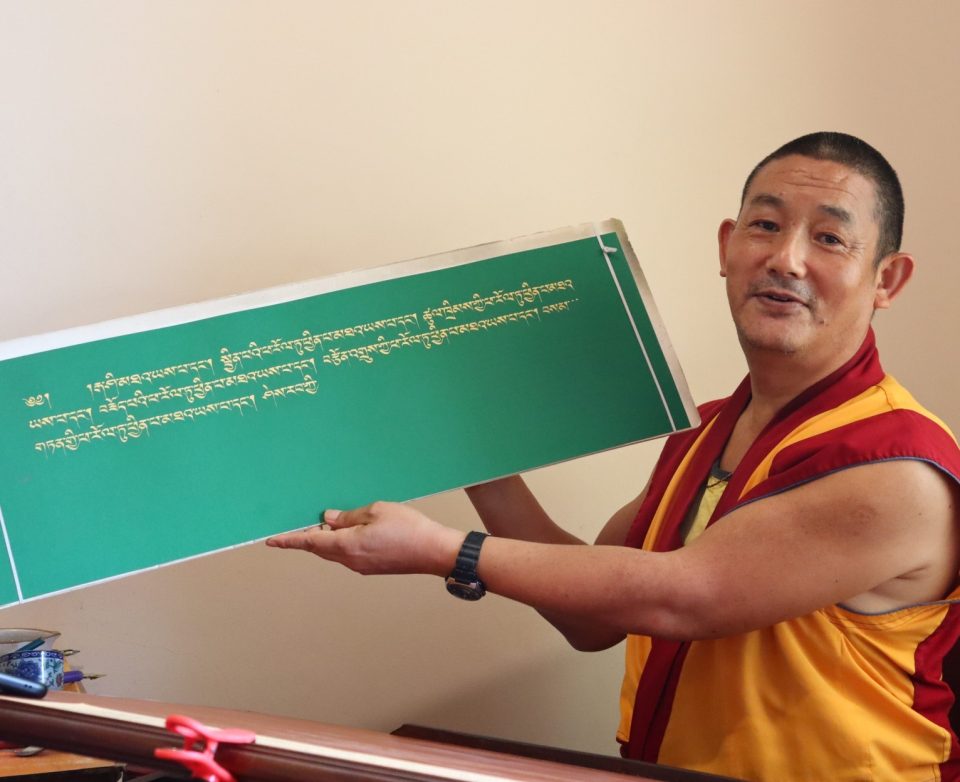
Ven. Lobsang Tsering displays a page of the Prajnaparamita he has been writing out.
In the heart of Kopan Monastery, nestled in the beautiful hills of Nepal, a quiet yet monumental task unfolds each day. Ven. Lobsang Tsering has been entrusted with a project that embodies the very essence of continuous joyous effort and guru devotion: writing the Prajnaparamita Sutra in beautiful calligraphy in pure gold ink on archival quality paper. This project for world peace has a huge significance for the entire FPMT community and should continue for as long as FPMT exists.
Ven. Lobsang Tsering’s journey of writing out the Prajnaparamita Sutra in gold began over two decades ago when Lama Zopa Rinpoche, recognizing his potential and devotion, assigned him this important job. Since then, Ven. Tsering has devoted himself wholeheartedly to this practice with unwavering focus, patience, wisdom and compassion. As of now, he is working on the fifth of twelve volumes, a testament to the magnitude of this task.
In a recent interview, conducted by Yanzhina Bartanova at Kopan Monastery, Ven. Lobsang Tsering shared his life story and the deep sense of responsibility he feels towards this assignment. His humility and dedication shine through as he recounts the moment Lama Zopa Rinpoche entrusted him with this work. His words offer a profound insight into the importance of the Prajnaparamita Sutra and the personal transformation he has experienced over the years. This interview provides a rare glimpse into the heart and mind of a practitioner whose life is devoted to the Buddhadharma.
You can read the full interview below and also watch it on video.
The Prajnaparamita Sutra contains the highest teachings of the Buddha and is among the most precious texts available in the world today. Due to the power of this text, writing it out is a way to generate tremendous merit, remove obstacles, and create peace in the world.
Each year, FPMT allocates over US$50,000 for the pure gold and related expenses. This financial commitment highlights the importance of this project within the FPMT community.
While Ven. Tsering’s contribution is unparalleled in its duration and intensity, he is not alone in this virtuous activity. Jane Seidlitz, working from the USA, has also been writing out the Prajnaparamita Sutra in pure gold. Although her involvement has not been for as long or as intense as Ven. Tsering’s, her contribution is equally valued and cherished. Together, their efforts symbolize a huge commitment to preserving the teachings of the Buddha.
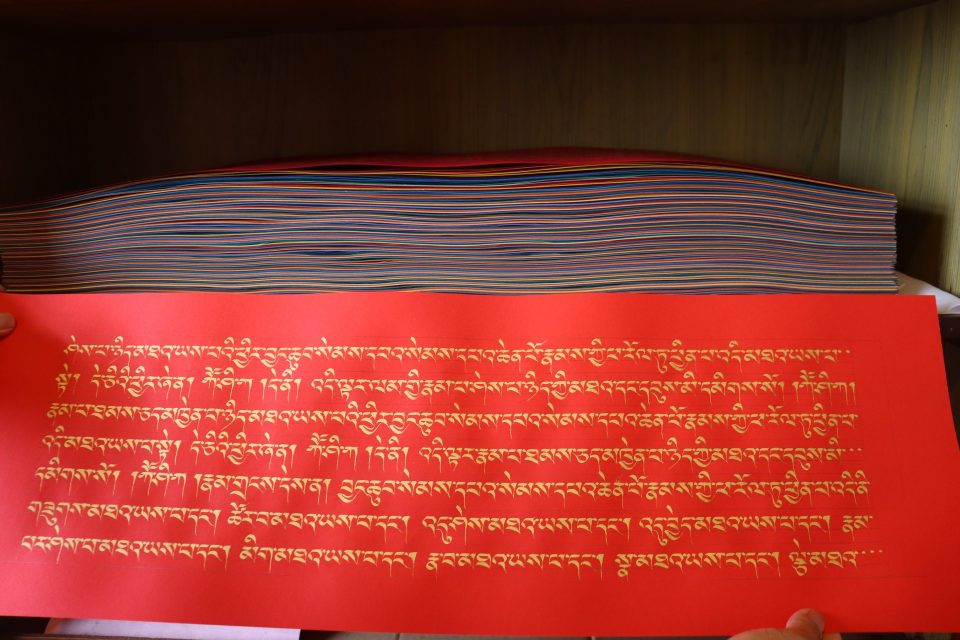
Pages of the Prajnaparamita that Ven. Lobsang Tsering has been writing out for over two decades.
This project is a living legacy of Lama Zopa Rinpoche’s vision, a vision that continues to inspire and uplift those who come into contact with it. Rinpoche asked that the sutra is continually being written out as it is a powerful holy object.
Interview with Ven. Lobsang Tsering
Gen la, can you please, introduce yourself?
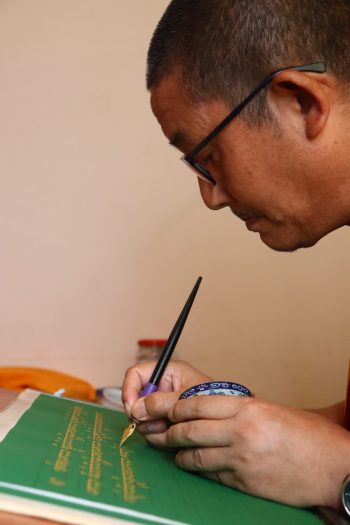
Ven. Lobsang Tsering writing out the Prajnaparamita from Kopan Monastery.
My name is Lobsang Tsering. Actually, my hometown name is Lobsang Tsering, but my gelong name is Thubten Dawa. I’m from Manang Village. It’s a very remote area here in Nepal.
At age of eight, my parents brought me here at Kopan. I grew up here with many children. It was good. I finished my study in 1990. Then I started to serve monastery, working in the office, as a lama gyupa, making sand mandalas. I also got a chance to do some translation work. Then Rinpoche invited me to the United States, I had an opportunity to go there. Rinpoche advised me to write out Prajnaparamita Sutra.
So then I studied again, Rinpoche was showing me caligraphy and the way how to write, how to set up the motivation and the dedication. I was so fortunate. At the beginning of 2002 I started writing out the first volume. It took me 5 years. The second volume took me 5 years. This is the 5th volume I’m working on right now.
So I’m all all the way, 70% of the fifth volume. I was so fortunate that I got this opportunity and I got to carry it on. Still now, my mind is so blessed. I feel like this. I’ve decided I will do it as long as my body supports me, my eyes support me. As long as the gold is supported. I decided I will carry on. Rinpoche has mentioned to me even after His passing away I have to keep writing. Rinpoche mentioned this on a few occasions.
Can you please explain for those who are very new to Buddhism, what is Prajnaparamita Sutra?
Prajnaparamita Sutra is the the wisdom of perfection. The wisdom of perfection was taught by Buddha in Rajgir. It has many different versions, like short, medium, and long versions. Shortest one is very common, well known, is the Heart Sutra, which consists of 25 stanzas, and then when we talk about the short version of the Prajnaparamita Sutra is 8,000 verses. Rinpoche was doing that one, writing in gold letters. And then the middle one is 20,000 verses, which has 3 volumes.
And then the long one is a 100,000 verses, which has 12 volumes. So that’s what I’m working on here right now. I’m on the 5th volume out of 12 volumes. It’s slowly but steadily is going on.
When we’re talking about the Heart Sutra is mainly we’re talking about the interdependent origination and emptiness, and it’s a very crucial teaching of the Buddha. That’s why it’s so important text of the Buddha. It is very important to write with the gold so to collect merit. So all the projects of Rinpoche and the FPMT will come true. As Buddhists we believe in order to fulfill or to accomplish the wishes, we need to have merits. So that’s the main reason why we are writing out Prajnaparamita Sutra to accumulate merit so all projects can be done without any obstacles. That was the main purpose.
Can you please explain what is merits and why we need to accumulate it for those who don’t know?
Merit is some kind of the positive energy. So the more negative energy around, the atmosphere becomes negative and then everything actually becomes negative. So all we need is positive energy around. So then positive energy in, out, everywhere. So more positive energy around, the wish come true. That’s what I understand. Something like a virtue as we say, it’s virtues actions. Also, positive energy.
Can you please advise people who would like to do the same as you do, to collect merits by writing out Prajnaparamita Sutra? What they can do, how they can start, if they want to do the same as you?
To write Prajnaparamita Sutra – anybody can do it, but what I understand for us, we need to have a wish to do. That’s so important. So if we have an eager to do it or wish to do it. To have a wish, we need to understand the benefit of that. If you understand the benefit of writing Prajnaparamita Sutra, then because of that the wish will come true. You have a wish, and then you make an effort, then you need to be trained, you can train, anything can be trained. So as we say once it’s habituated, there’s nothing that cannot be done. So that’s all, we need to make an effort on that.
So to make an effort, we need to have a wish first. Then we can do anything – writing out Prajnaparamita Sutra, writing or reading, with the gold or with the ink. It doesn’t matter. While you are writing, make sure that you set up a bodhichitta motivation, it’s very important. Or fulfilling the guru’s wishes or for the sake of the Buddhadharma or Buddha’s teaching or for the sake of all mother sentient beings.
These are very important motivation that we need to set up at the beginning. And then once we done that and then whatever you do or whatever skill you have, you offer your time. So we can do it for years, keep carrying it on as your own practice. Once you carry on as your practice, gradually, maybe a year after year, after year, you keep doing that. I believe by doing that, we will create a lot of positive karma as well and same time with a lot of purification. The more we purify our negative karma, the more positive karma will raise. It felt to me like that.
So with less negative karma, more positive karma will be naturally there. With more positive karma there, your willingness will increase. Then you will be doing more and more and more. More purification is happening, more and more you turn towards the Dharma. More and more compassion is coming. More and more positive thoughts are coming.
More and more you feel devoted to your guru. You feel more kindness.
So this all automatically comes. So that’s very important. To make an effort with it. And by the way, we were saying that short term effort will make a short result, but we have to carry on.
So seriously, keep carrying on, and the rest will be okay. Since we are beginners we need to make effort without losing a hope. No matter what obstacles you may encounter or the challenge you may encounter, but thing is – it’s Dharma practice for the sake of all mother sentient beings. It’s for all Buddhadharma. So if you’re thinking this way, if you keep it in your mind, recollecting it in your mind, then the energy will come. And then you can carry on year after year, after year, after year. And then finally, after 10 years, 20 years, you will see the benefit, and then you’ll find the peace of your mind. And once you have peace of mind you will see how important Buddhadharma is.
All these are coming to you. But definitely we need to make it long. We have to plan for long term.
You discussed a lot about benefits of writing, reading, seeing Prajnaparamita. What would be the top three benefits if we narrow them down?
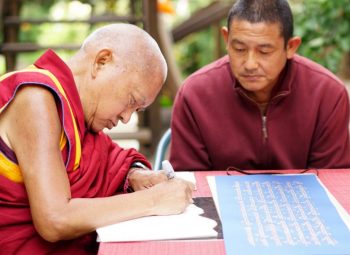
Lama Zopa Rinpoche working on writing out the Prajnaparamita Sutra with Ven. Tsering at his side, Aptos, California, United States, June 2017. Photo by Ven. Lobsang Sherab.
First, I think is the imprint. The imprint is so important. Sometimes what I do is I play His Holiness Dalai Lama’s teachings. Because I cannot play a song here [laughing], I like playing lamas’ teachings.
So this all comes together. That gives me a lot of knowledge as well. I believe when I first began my writing I can say that I didn’t understand Dharma. I was a monk. I was happy in the monastery. So I carried on like that because of kindness of Rinpoche. But when I look back now, I didn’t understand Dharma at that time.
But luckily, while I’m writing it, I listen to His Holiness’ teachings or Rinpoche’s teachings. Then in between, there are some questions coming up and also negative questions are coming. I’m still a normal human being, so they’re all these nonsense questions are coming. But luckily, because of writing out Prajnaparamita Sutra I got all the answers, which really keeps me strong! So this is how I’m able to carry on still now, after almost 23 years. My mind is still going on maybe because of this. I will say this is the benefit of writing out Prajnaparamita Sutra and listening to teachings. So that’s the first benefit.
The second benefit, definitely, because of doing this, I feel myself very peaceful. Very satisfied with myself. Because of that I can sleep peacefully. Because of that, I can feel my body. So that’s a benefit too. Because as long as we keep our mind in peace our health will be good. Because of that, we could sleep. You can happily live with anybody around. So that’s the second benefit.
The third benefit, of course, it will guide us to the enlightenment. Rinpoche told me one time, “Tsering, because you’re writing out Prajnaparamita, this will guide you to the enlightenment!”. This is so important to me. Wow! There are so many benefits of doing this!
[Please watch a two-part video of Lama Zopa Rinpoche explaining some of the profound benefits of writing out the Prajnaparamita Sutra and why he started this project]Can you please describe briefly your day at work?
Here at Kopan, I get up around 6 o’clock in the morning, and then I make my water bowl offering. I set up my motivation in the morning. And then do a half part of my prayers, and then go for breakfast around 7:30am. Come back and finish all my prayers.
I finish by 9 or 9:30am. Then I come here and get prepared for my day for the writing out Prajnaparamita Sutra. I prepare everything, like mixing gold with glue, paper. Make a cup of tea. Then again, I set up the motivation here. I’m writing till 11:30am, and then I have a lunch break till 1 o’clock in the afternoon, and then I’m writing from 1 o’clock till 4 o’clock. That is my period of writing Prajnaparamita Sutra. Then after 4pm, I dedicate. That’s so important practice of Dharma. When we’re setting the motivation and at the end we do dedication. If we don’t dedicate at the end, what happens is because we have a lot of delusions inside, such as anger or attachment or something like that. We don’t know when it will arise. So at the moment of anger, they say, that countless, many years of merits will be destroyed. That’s why dedication is so important. I set up dedication, that’s the end of my day. Then I make a cup of tea in my room, get rest. Then I go for a walk. I need to walk because I need to move my body, doing exercise so I will be able to carry on. We need a good health. Without a good health, it’s not possible. That’s very important for the Prajnaparamita project, for the practice of Dharma, whatever activities you are doing the health is so important. So that’s why I go for a walk maybe an hour or so. While I’m walking, I recite the mantras that I need to recite. Then around 6:30pm is dinner, then at the end, again, I have evening prayers to do. Maybe half an hour. And then rest. That is my 5 days a week, 2 days I take days off.
Another question is, you are doing this virtuous activity for more than 20 years. What encouraged you to start this activity?
At that time it was Rinpoche’s power. Rinpoche invited me to America. Rinpoche trusted me. My mind would feel bad, if I didn’t obey Rinpoche. That mind kept me there. Secondly, it’s because Rinpoche is so pure! More we serve him, we want to serve even more.
Maybe Rinpoche’s power. A lot of my friends are saying that I’m the only one who got the renunciation after going to America. Mostly people go to America and they finish their monks life. They want to live a normal life. I think most are like that. Just a few came back still as monks. I am the one of them. So that’s why I feel very blessed.
I would definitely say because of Rinpoche’s power. One reason is I’m in the mandala of Rinpoche. So I need to do well. I’m also a Kopan boy. I need to respect Kopan as well. So this kind of mind helps me to carrying on. Maybe at the beginning I didn’t understand, but because of this kind of mind it helped me. After I’ve been writing for 6-7 years I started to understand. Started to understand maybe 6-7 years after. At the beginning for many of us, we don’t pay attention because we’re young. We just go around or something like that. But once we start to understand, all answers come. Like I said I listened to His Holiness’ teachings and Rinpoche’s teachings. Then I found all the answers to my questions. Then my mind became stronger. I feel very joyous! Now I feel like if I don’t do, if I don’t write one day, I feel like I’m wasting my day.
So important to make sure your day is meaningful. As we say, we have a precious human rebirth, it is so important. If we miss this time, then next life, we don’t know where we will be reborn. As we understand all these things, it’s so important to make sure, while you have this precious human rebirth, you use it in a meaningful way. By thinking that, I’m using it as maximum as possible. So here I am.
You talked about meaningful life, happy life, not wasting your life. So what would be your one advice for people to live happy, meaningful life?
I would say don’t engage in any kind of “happy” negativities. Don’t do that. Live the life positive as much as you can. I think in that way you will definitely find a happy life. Carry on year after year, year after year. You’ll find deep satisfaction, because of your positive actions, positive deeds that you have done in your entire life. If you do some negative action somehow, somewhere you have a regret in your mind. That leading you to the problems, unhappiness, depression. Make sure your day, your month, years are meaningful in the positive way. That’s so important. Then to live in the positive, living with the bodhicitta is the most important. That’s the essence of the Dharma as we say. You live the best way with compassion, with bodhicitta. If not, then at least, restrain from the negative actions as much as you can. Even the small negative action, we have to restrain from it. You have to avoid it.
If you do that, maybe at the end of your life, you will be able to find a deep satisfaction. Then you will definitely be happy. That’s what I believe.
We offer grateful thanks to Yanzhina Bartanova for conducting this extremely moving interview.
As we reflect on Ven. Tsering’s journey and the ongoing efforts of individuals like Jane Seidlitz, we may be inspired to support this incredible work. Whether through financial contributions or rejoicing in this achievement, we can all be part of this extraordinary endeavor. In doing so, we create an incredible amount of merit and help ensure that the Prajnaparamita Sutra continues to shine brightly, guiding countless beings toward the path of enlightenment.
You can learn more about the Prajnaparamita Project as well as the other Charitable Projects of FPMT.
- Home
- News/Media
- Study & Practice
- About FPMT Education Services
- Latest News
- Programs
- New to Buddhism?
- Buddhist Mind Science: Activating Your Potential
- Heart Advice for Death and Dying
- Discovering Buddhism
- Living in the Path
- Exploring Buddhism
- FPMT Basic Program
- FPMT Masters Program
- FPMT In-Depth Meditation Training
- Maitripa College
- Lotsawa Rinchen Zangpo Translator Program
- Universal Education for Compassion & Wisdom
- Online Learning Center
- Prayers & Practice Materials
- Overview of Prayers & Practices
- Full Catalogue of Prayers & Practice Materials
- Explore Popular Topics
- Benefiting Animals
- Chenrezig Resources
- Death & Dying Resources
- Lama Chopa (Guru Puja)
- Lama Zopa Rinpoche: Compendium of Precious Instructions
- Lama Zopa Rinpoche: Life Practice Advice
- Lama Zopa Rinpoche Practice Series
- Lamrim Resources
- Mantras
- Prayer Book Updates
- Purification Practices
- Sutras
- Thought Transformation (Lojong)
- Audio Materials
- Dharma Dates – Tibetan Calendar
- Translation Services
- Publishing Services
- Teachings and Advice
- Find Teachings and Advice
- Lama Zopa Rinpoche Advice Page
- Lama Zopa Rinpoche: Compendium of Precious Instructions
- Lama Zopa Rinpoche Video Teachings
- ༧སྐྱབས་རྗེ་བཟོད་པ་རིན་པོ་ཆེ་མཆོག་ནས་སྩལ་བའི་བཀའ་སློབ་བརྙན་འཕྲིན།
- Podcasts
- Lama Yeshe Wisdom Archive
- Buddhism FAQ
- Dharma for Young People
- Resources on Holy Objects
- Ways to Offer Support
- Centers
- Affiliates Area
- Teachers
- Projects
- Charitable Projects
- Make a Donation
- Applying for Grants
- News about Projects
- Other Projects within FPMT
- Support International Office
- Projects Photo Galleries
- Give Where Most Needed
- FPMT
- Shop
Translate*
*powered by Google TranslateTranslation of pages on fpmt.org is performed by Google Translate, a third party service which FPMT has no control over. The service provides automated computer translations that are only an approximation of the websites' original content. The translations should not be considered exact and only used as a rough guide.The office is a place for Dharma practice. When one goes to the office, dealing with people, one has to recognize it’s a place to practice lam-rim, the three principles of the path, tantra, and the six paramitas. The six paramitas fit very well for daily life. They offer protection for you. Everything is there.







